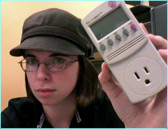So far, I've spent a lot of time dreaming up plans for monitoring power use. But before I dive into particulars, I want to draw a bit of the big picture.
According to the U.S. Department of Energy, U.S. residents used a little less than 100,000 kilowatt-hours per person in 2007.
That much energy could power almost 1,000,000 100-watt lightbulbs for an hour.

Here's another way to think of it. We'd have to burn 8 gallons of gasoline, per person, per day to generate that much energy.
The DOE site mentioned that energy consumption data was collected by the EIA--The Energy Information Administration, but I wasn't able to dig up the numbers and method behind those figures. So I'm not sure if the above information includes all aspects of a person's energy use, or just what they use at home. (Another DOE page suggested that over a quarter of the average person's energy use comes from transportation.)
For this project, I decided to divide my energy use into three main sectors: home, work and transportation.
At Home
In general, about half of home power use goes toward heating and cooling a living space. Lighting takes the next big slice out of the pie, then refrigeration, water heaters, various small appliances, and so on down the line.
I'm curious to see what the most power hungry part of my home will be. I'll check out the energy used by small and large appliances and keep an eye on our gas and electricity meter.
I spent some time trying to decide if hot water use was relevant enough. The government convinced me that it's worth looking into. So I'll be taking that into account as well.
At Work
As you might expect, my employer is pretty environmentally conscious. We have a rooftop garden, low-flow toilets, and the lights in the office are governed by motion-sensors. (As I was writing this, they flipped off. I guess everyone was being extraordinarily still. A bit of jumping around was needed.)
In the interest of fairness, I plan to ignore all the good measures taken by WGBH and focus in on my prodigal personal space. I'll be monitoring the energy used by my computer and various other electronics (basically anything that wouldn't be running if not for my button pushing.) This includes the toaster, microwave, coffee maker, and, of course, the elevators.
Transportation
This section is the least defined for now. In kinder weather I commute by bike, but recent snowstorms have driven me to the bus, subway and the occasional ride from car-owning friends.
This one needs a bit more thought and will get its own post.
I'll update a bit more as I start to get readings on different appliances around the workplace and at home. Next post, I'll say a bit more about how I'm getting those numbers and introduce you to my new friend--the multimeter.
The stopwatch, by the way, along with a recently acquired bucket, is for measuring hot-water use. I'm not looking forward to week two (the conservation phase of the experiment) on that one.


as you picture those old light bulbs, I can think of all the street lights across America that burn all night. they are 250 watt to 350 watt for most lights.
add shopping center parking lots I'm not sure. if we could stop this burn...we could do something.
I can't help to think that compact florescent lights (CFL) save some but nobody is pushing LED lights. they use about 1/10th less than CFLs (I believe.) maybe you might want to look into it....but they do cost a lot.
to talk of global warming....a 100 watt bulb is hot, a 250 street light must really be hot. then figure out it takes about 60% more watts to generate it at a power company.